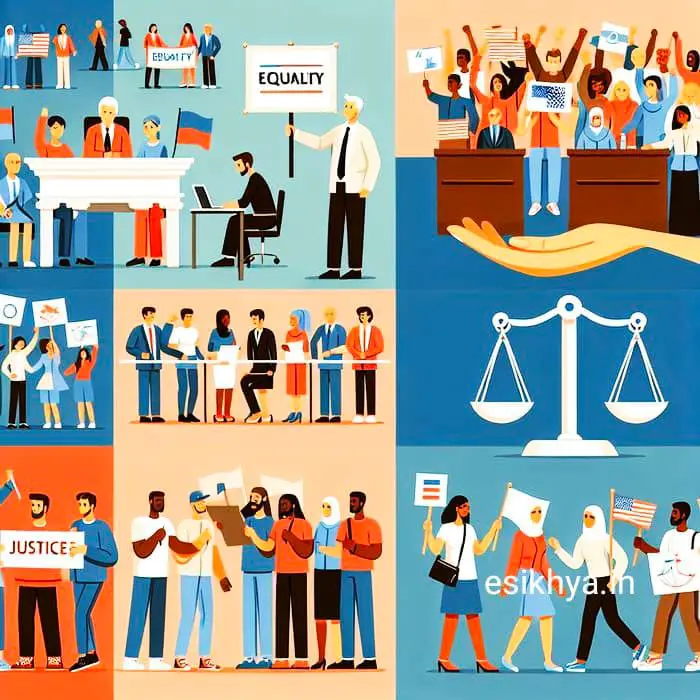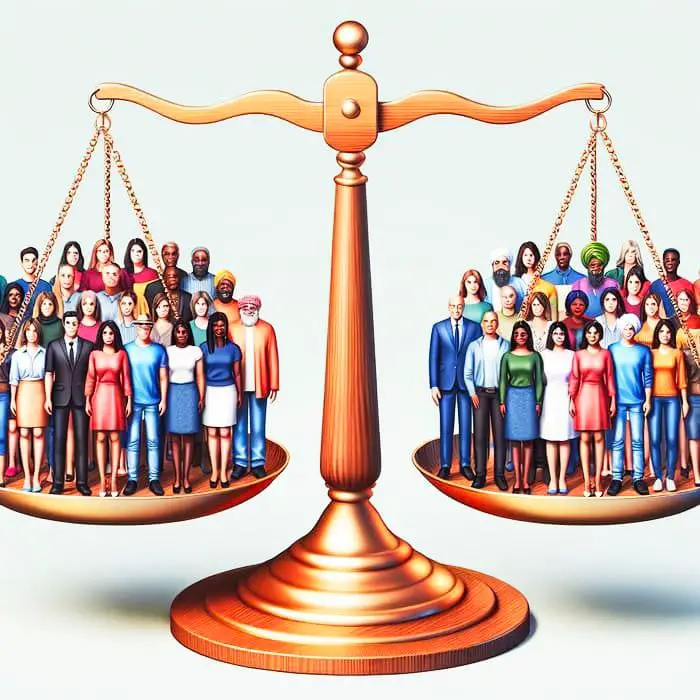Equality refers to the concept that all individuals are entitled to the same rights, opportunities, and treatment without discrimination. It emphasizes fairness and justice in social, political, and economic spheres, ensuring that no one is denied opportunities or privileges based on factors like race, gender, religion, socio-economic status, or other attributes.

Types of Equality
There are various forms of equality, each addressing different aspects of human life:
1. Social Equality
- Definition: Equal status and opportunities for all individuals within society, regardless of social class, caste, ethnicity, gender, or other social divisions.
- Goal: To remove social hierarchies and prevent any form of discrimination that could result from societal norms.
- Example: Equal access to education, healthcare, housing, and other basic services.
2. Economic Equality
- Definition: A level playing field where wealth, resources, and opportunities are distributed fairly, so individuals have equal economic opportunities to improve their standards of living.
- Goal: To reduce extreme disparities in wealth and income.
- Example: Ensuring everyone has access to job opportunities, fair wages, and social welfare support to prevent poverty and economic exploitation.
- Debate: There are disagreements over how much economic equality should be pursued, with some advocating for equality of outcome (redistributing wealth) while others support equality of opportunity (ensuring fair competition).
3. Political Equality
- Definition: All citizens having equal rights to participate in political processes, including voting, running for office, and having their voices heard in governance.
- Goal: To ensure that everyone has the same political influence, regardless of their social or economic background.
- Example: Universal suffrage (the right to vote) and equal representation in political decision-making.
4. Legal Equality (Equality before the Law)
- Definition: All individuals are subject to the same laws and have the same legal rights and protections, without discrimination.
- Goal: To ensure that the law is applied fairly to all, without giving preferential treatment to certain groups.
- Example: Equal access to justice, the same penalties for crimes regardless of the offender’s identity, and anti-discrimination laws.
5. Gender Equality
- Definition: Equal rights, responsibilities, and opportunities for individuals of all genders, including men, women, and non-binary individuals.
- Goal: To eliminate gender-based discrimination and barriers that prevent individuals from reaching their full potential.
- Example: Equal pay for equal work, equal representation in leadership roles, and freedom from gender-based violence.
6. Racial and Ethnic Equality
- Definition: The equal treatment and consideration of individuals regardless of their race, ethnicity, or cultural background.
- Goal: To combat racial prejudice, segregation, and systemic racism, promoting an inclusive society where diversity is respected.
- Example: Anti-racism laws, equal employment opportunities, and fair representation of all racial and ethnic groups in media, education, and government.
7. Educational Equality
- Definition: Equal access to quality education for all individuals, regardless of their socio-economic background, gender, or location.
- Goal: To ensure that everyone has the opportunity to gain the knowledge and skills necessary for personal and professional development.
- Example: Policies that provide free or affordable education and initiatives to reduce disparities between public and private schooling.
8. Opportunity Equality
- Definition: The concept that everyone should have the same chances in life to pursue opportunities, such as education, jobs, and personal development.
- Goal: To remove barriers such as discrimination or unequal starting conditions that prevent some from accessing the same opportunities.
- Example: Affirmative action policies designed to give disadvantaged groups greater access to higher education and employment.
9. Religious Equality
- Definition: The right of individuals to practice, change, or abstain from religious beliefs without discrimination or fear of persecution.
- Goal: To ensure that no one is favored or discriminated against based on their religion or belief system.
- Example: Freedom of religion laws that prevent government or societal discrimination based on religious affiliation.
Key Distinctions
- Equality of Opportunity: Ensuring everyone has the same starting point to compete and succeed, with no artificial barriers.
- Example: Equal access to education, job markets, or political participation.
- Equality of Outcome: Striving for similar outcomes across different groups by redistributing resources or opportunities to reduce inequalities.
- Example: Policies that ensure wealth redistribution, quotas in hiring, or equal educational achievements among various demographics.
Challenges to Equality
While equality is a fundamental goal, achieving it can be difficult due to:
- Historical Inequalities: Deep-rooted injustices based on race, gender, or class often persist.
- Discrimination and Bias: Social prejudices and institutional biases can perpetuate inequality.
- Global Disparities: There are significant differences in wealth and opportunities between nations, making global equality a major challenge.
In summary, equality involves ensuring that everyone has the same basic rights and opportunities, free from discrimination or bias. The different types of equality address various dimensions of human life, from economic and legal to social and political rights. The aim is to create a just and inclusive society where everyone can reach their full potential.

